Tata Consultancy Services Bundle
Who Really Owns Tata Consultancy Services?
Unraveling the Tata Consultancy Services SWOT Analysis reveals more than just its strengths and weaknesses; it also highlights the significance of understanding its ownership. Knowing the TCS parent company and the distribution of its shares is crucial for any investor or business strategist. This knowledge provides a foundation for informed decision-making.
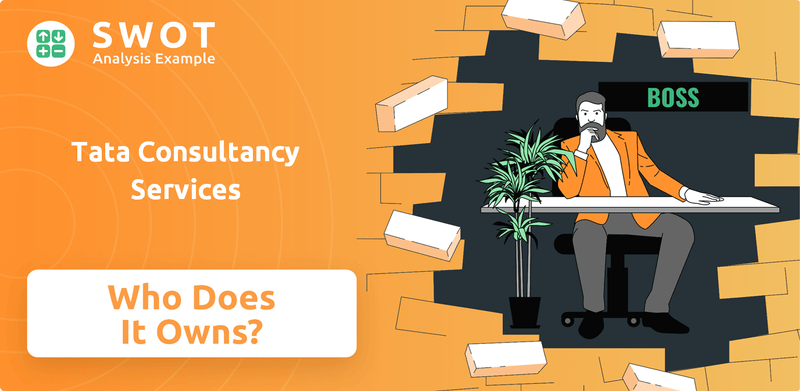
The evolution of TCS, from its inception within the Tata Group to its current status as a publicly traded giant, is a compelling story of growth and strategic adaptation. Understanding the TCS ownership structure, including the roles of TCS shareholders and the influence of the Tata Group, offers invaluable insights into its strategic direction and market position. As of April 2025, TCS India remains a dominant force in the global IT landscape, making its ownership a key area of interest.
Who Founded Tata Consultancy Services?
The origins of Tata Consultancy Services (TCS) trace back to 1968, emerging as a division within Tata Sons Limited. This structure meant that the initial ownership was not through individual founders but was entirely vested in Tata Sons, the primary holding company of the Tata Group. This unique setup shaped TCS's early trajectory and strategic direction.
J.R.D. Tata, the then-chairman of Tata Sons, played a crucial role in recognizing the potential of IT services. He envisioned the need for an IT arm within the group. F.C. Kohli, often hailed as the father of the Indian software industry and the first CEO of TCS, was instrumental in shaping the company's early direction. Kohli's background as an electrical engineer and his foresight in recognizing the potential of computing in India were key.
From its inception, TCS's operations and investments were funded internally by Tata Sons. This eliminated the need for external investors or individual equity splits. The focus was on building a robust IT services capability that would serve the internal needs of the Tata Group and cater to the growing global demand for software services. This approach allowed TCS to grow under the complete control and strategic direction of Tata Sons.
Understanding the initial ownership structure of TCS is crucial for grasping its development. Here are the key takeaways:
- Tata Sons Ownership: TCS was established as a division of Tata Sons, meaning the parent company initially held 100% ownership.
- No External Investors: The early funding came entirely from Tata Sons, with no external investors during the initial phase.
- Leadership Influence: J.R.D. Tata and F.C. Kohli were pivotal in shaping TCS's vision and direction.
- Strategic Focus: The primary goal was to develop IT services for the Tata Group and the global market.
- No Individual Equity Splits: Given its divisional status, individual equity splits among founders were not applicable.
Tata Consultancy Services SWOT Analysis
- Complete SWOT Breakdown
- Fully Customizable
- Editable in Excel & Word
- Professional Formatting
- Investor-Ready Format
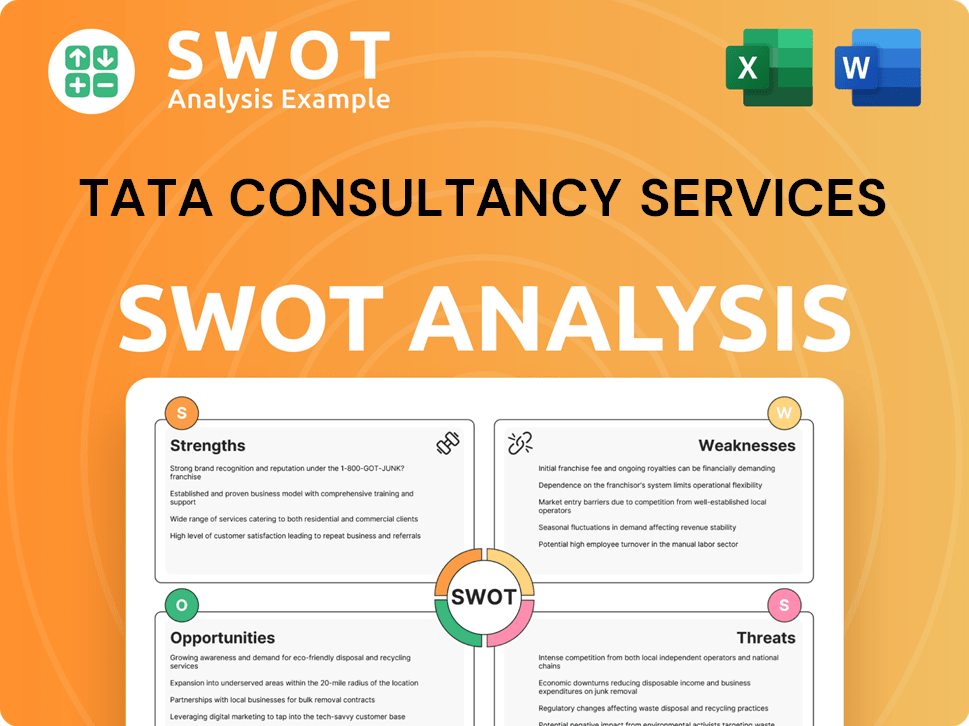
How Has Tata Consultancy Services’s Ownership Changed Over Time?
The most significant shift in the Tata Consultancy Services (TCS) ownership structure came with its Initial Public Offering (IPO) on August 5, 2004. Before the IPO, TCS was a wholly-owned subsidiary of Tata Sons Limited. The IPO transformed TCS into a publicly listed company. At the time of its IPO, TCS had an initial market capitalization of approximately INR 47,000 crore, which was around $10.2 billion USD based on the exchange rates then.
Following the IPO, Tata Sons maintained a substantial majority stake, ensuring its continued control over the company. This event marked a crucial transition in TCS's journey, opening access to capital markets for expansion while still maintaining the strategic direction under the Tata Group's stewardship. The listing provided a platform for growth and enhanced visibility in the global market.
| Event | Date | Impact on Ownership |
|---|---|---|
| Initial Public Offering (IPO) | August 5, 2004 | Transition from wholly-owned subsidiary to publicly listed company; Tata Sons reduced its stake but retained majority control. |
| Ongoing Shareholder Activity | Post-IPO | Public shareholders, including institutional and retail investors, acquired shares. Tata Sons maintained a significant stake. |
| Recent Shareholding Updates | As of March 31, 2025 | Tata Sons Private Limited holds approximately 72.41% of the company's shares, indicating continued strategic control. |
As of March 31, 2025, the primary owner of Tata Consultancy Services is Tata Sons Private Limited, holding approximately 72.41% of the shares. This significant stake highlights Tata Sons' enduring strategic influence over TCS. The remaining shares are distributed among public shareholders, including institutional investors, mutual funds, foreign portfolio investors, and individual retail investors. Major institutional investors often include large global asset management firms and pension funds. For example, as of December 31, 2024, various foreign institutional investors and domestic mutual funds hold significant shares, reflecting their confidence in TCS's market position and growth prospects. This ownership structure allows TCS to pursue long-term strategic initiatives with stability, while the public listing provides access to capital markets for expansion and growth.
Tata Sons Private Limited is the primary owner of Tata Consultancy Services, holding approximately 72.41% of the shares as of March 31, 2025. This ownership structure ensures strategic control and alignment with the broader Tata Group's values.
- The IPO in 2004 transformed TCS into a publicly listed company.
- Public shareholders include institutional investors, mutual funds, and retail investors.
- The strong promoter holding influences governance and long-term vision.
- TCS's ownership structure supports its ability to pursue long-term strategic goals.
Tata Consultancy Services PESTLE Analysis
- Covers All 6 PESTLE Categories
- No Research Needed – Save Hours of Work
- Built by Experts, Trusted by Consultants
- Instant Download, Ready to Use
- 100% Editable, Fully Customizable
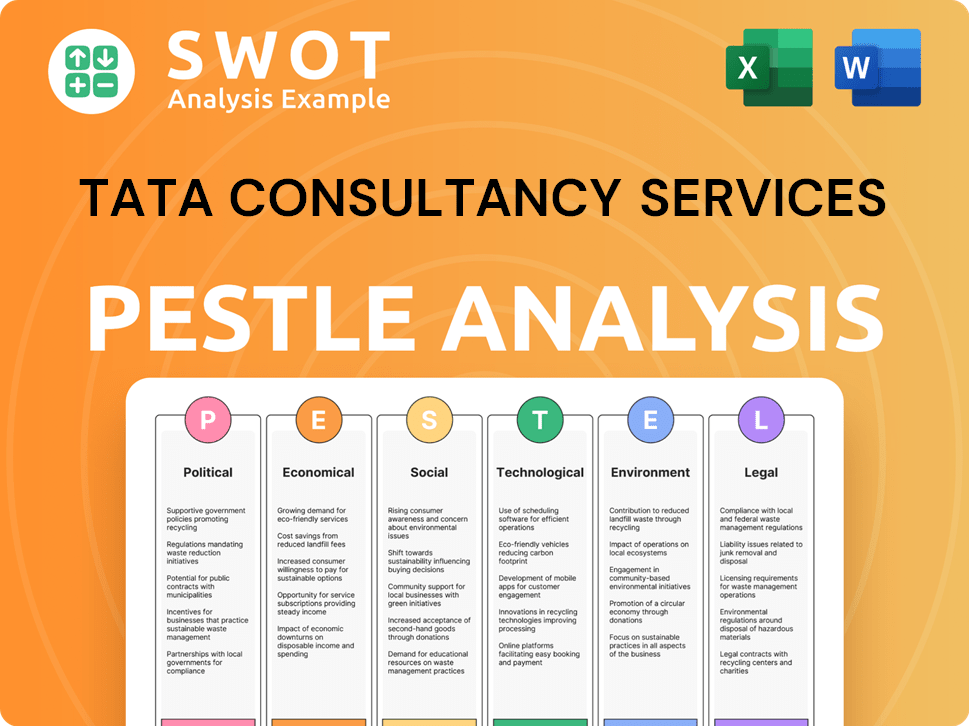
Who Sits on Tata Consultancy Services’s Board?
The Board of Directors of Tata Consultancy Services (TCS) is key to the company's governance. As of April 2025, the board includes executive directors, non-executive directors representing the Tata Group (the promoter group), and independent directors. N. Chandrasekaran, also the Chairman of Tata Sons, chairs the board, highlighting the strong connection between TCS and its parent company. Key board members include K. Krithivasan (current CEO and Managing Director) and Rajesh Gopinathan (former CEO and Managing Director, now a non-executive director), along with independent directors who provide external expertise and oversight. The board's composition ensures a balance between promoter representation and independent voices, reflecting a governance structure designed to maintain stability while adhering to best practices for publicly listed companies.
The board's structure is designed to maintain stability while adhering to best practices for publicly listed companies. This structure helps ensure that TCS operates efficiently and in the best interests of all its stakeholders. The presence of independent directors is particularly important for overseeing management decisions and protecting the interests of minority shareholders. This structure is crucial for maintaining investor confidence and ensuring long-term value creation. The board's diverse composition, with a mix of executive, non-executive, and independent directors, provides a comprehensive approach to corporate governance.
| Board Member | Role | Affiliation |
|---|---|---|
| N. Chandrasekaran | Chairman | Tata Sons |
| K. Krithivasan | CEO and Managing Director | Tata Consultancy Services |
| Rajesh Gopinathan | Non-Executive Director | Tata Consultancy Services |
| Independent Directors | Various | External Experts |
TCS operates under a one-share-one-vote structure. This means each equity share has equal voting rights. There are no known instances of dual-class shares or special voting rights. Tata Sons' significant majority stake, approximately 72.41%, gives it controlling voting power. This allows it to determine strategic decisions, elect board members, and influence major corporate actions. The independent directors play a vital role in ensuring good corporate governance and protecting minority shareholder interests. This structure ensures that the Competitors Landscape of Tata Consultancy Services remains competitive.
Tata Sons, the parent company, holds a significant majority stake in Tata Consultancy Services. This gives Tata Sons substantial control over the company's strategic direction and operations.
- The Board of Directors includes members from Tata Sons and independent directors.
- TCS operates under a one-share-one-vote system.
- Tata Sons' ownership translates directly into controlling voting power.
- Independent directors ensure good corporate governance.
Tata Consultancy Services Business Model Canvas
- Complete 9-Block Business Model Canvas
- Effortlessly Communicate Your Business Strategy
- Investor-Ready BMC Format
- 100% Editable and Customizable
- Clear and Structured Layout
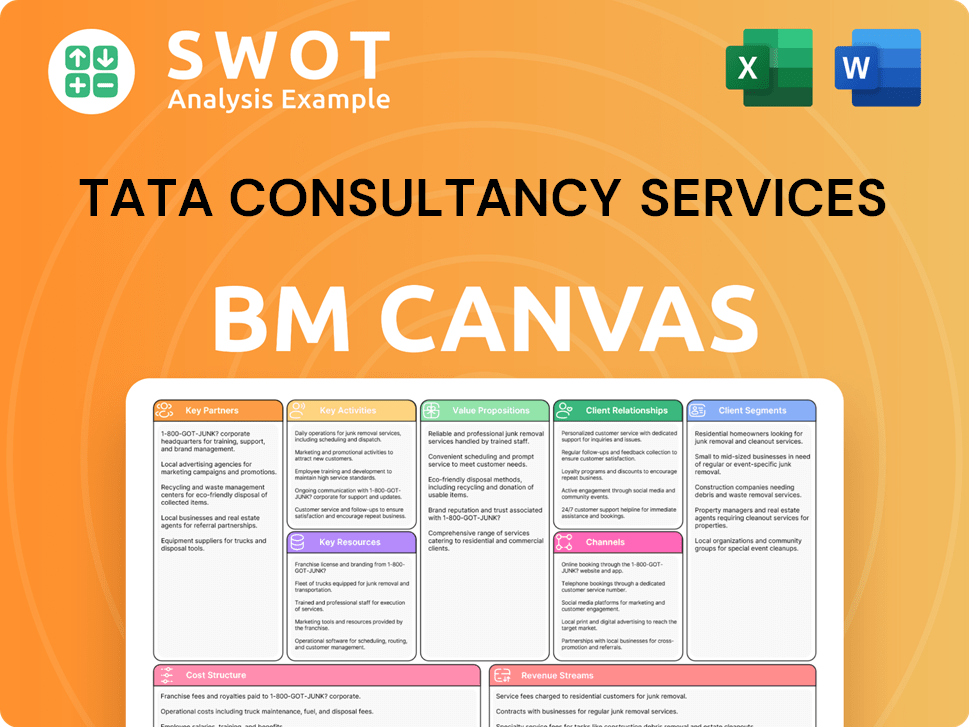
What Recent Changes Have Shaped Tata Consultancy Services’s Ownership Landscape?
In the past few years, the ownership structure of Tata Consultancy Services (TCS) has remained largely consistent, with Tata Sons maintaining a dominant position. The company has engaged in share buybacks, such as the INR 16,000 crore buyback completed in March 2022 and another of a similar size initiated in October 2023. These actions are designed to increase shareholder value, but they don't significantly alter Tata Sons' control. The primary changes have been internal, like the shift in leadership from Rajesh Gopinathan to K. Krithivasan as CEO and Managing Director in June 2023. The overall trend suggests a stable ownership profile for TCS, reflecting the strategic long-term management of the Tata Group.
Industry trends show increasing institutional ownership within the IT sector. Large global funds continue to invest in established companies like TCS. The structure of TCS, originating as a division of Tata Sons, means that the dilution primarily occurred during the IPO. Subsequent changes are more related to public market dynamics. There have been no public announcements about potential privatization or a substantial reduction in Tata Sons' stake. This indicates a stable ownership structure is expected to continue. For further insights, consider exploring the Marketing Strategy of Tata Consultancy Services.
| Ownership Aspect | Details | Recent Data (2024-2025) |
|---|---|---|
| Parent Company | Tata Sons | Dominant shareholder, no significant change in stake |
| Share Buybacks | Capital returned to shareholders | INR 16,000 crore buyback (March 2022), similar size initiated (October 2023) |
| Leadership Changes | Internal succession | K. Krithivasan became CEO and Managing Director in June 2023 |
| Institutional Ownership | Increasing trend | Large global funds continue to invest |
As of early 2024, TCS remains a publicly listed company with Tata Sons holding a significant majority stake. The company's strategic focus remains on growth and shareholder value, as demonstrated by the share buyback programs. These programs provide a return of capital to shareholders and can influence the public float, but they do not significantly affect the overall ownership control by Tata Sons.
Tata Sons maintains a stable controlling stake in TCS. Share buybacks are common to boost shareholder value. Leadership changes are internal successions.
Increasing institutional investor interest in the IT sector. TCS benefits from its established position. No major shifts in ownership are anticipated.
Share buybacks return capital to shareholders. These actions do not dilute Tata Sons' control. The company focuses on long-term growth.
No plans for privatization or significant stake reduction. The Tata Group's long-term strategy is key. Stable ownership is expected to continue.
Tata Consultancy Services Porter's Five Forces Analysis
- Covers All 5 Competitive Forces in Detail
- Structured for Consultants, Students, and Founders
- 100% Editable in Microsoft Word & Excel
- Instant Digital Download – Use Immediately
- Compatible with Mac & PC – Fully Unlocked
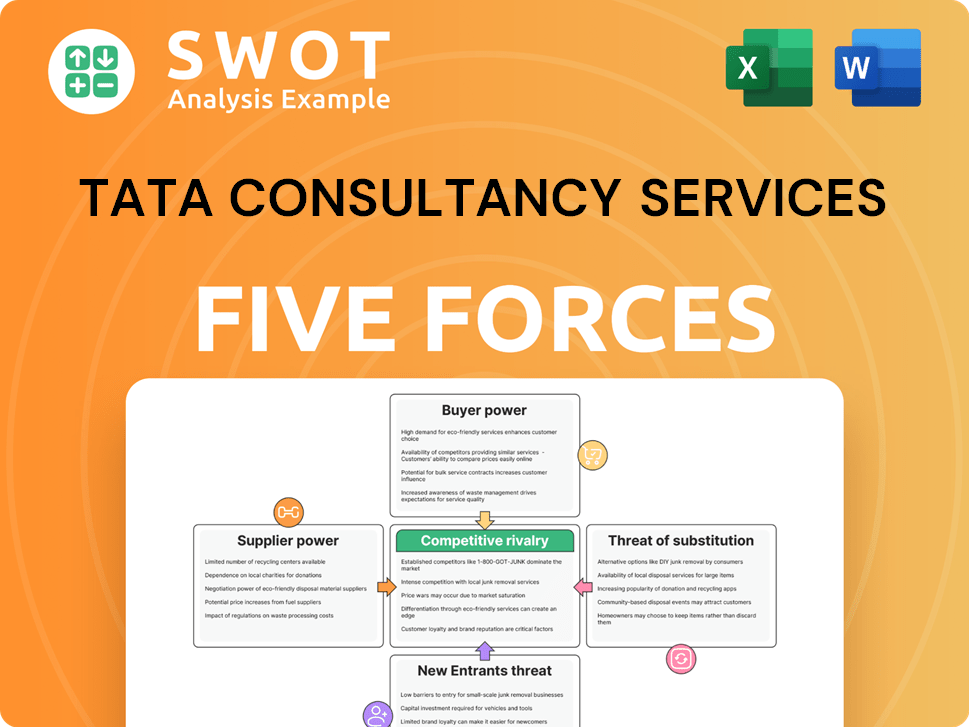
Related Blogs
- What are Mission Vision & Core Values of Tata Consultancy Services Company?
- What is Competitive Landscape of Tata Consultancy Services Company?
- What is Growth Strategy and Future Prospects of Tata Consultancy Services Company?
- How Does Tata Consultancy Services Company Work?
- What is Sales and Marketing Strategy of Tata Consultancy Services Company?
- What is Brief History of Tata Consultancy Services Company?
- What is Customer Demographics and Target Market of Tata Consultancy Services Company?
Disclaimer
All information, articles, and product details provided on this website are for general informational and educational purposes only. We do not claim any ownership over, nor do we intend to infringe upon, any trademarks, copyrights, logos, brand names, or other intellectual property mentioned or depicted on this site. Such intellectual property remains the property of its respective owners, and any references here are made solely for identification or informational purposes, without implying any affiliation, endorsement, or partnership.
We make no representations or warranties, express or implied, regarding the accuracy, completeness, or suitability of any content or products presented. Nothing on this website should be construed as legal, tax, investment, financial, medical, or other professional advice. In addition, no part of this site—including articles or product references—constitutes a solicitation, recommendation, endorsement, advertisement, or offer to buy or sell any securities, franchises, or other financial instruments, particularly in jurisdictions where such activity would be unlawful.
All content is of a general nature and may not address the specific circumstances of any individual or entity. It is not a substitute for professional advice or services. Any actions you take based on the information provided here are strictly at your own risk. You accept full responsibility for any decisions or outcomes arising from your use of this website and agree to release us from any liability in connection with your use of, or reliance upon, the content or products found herein.